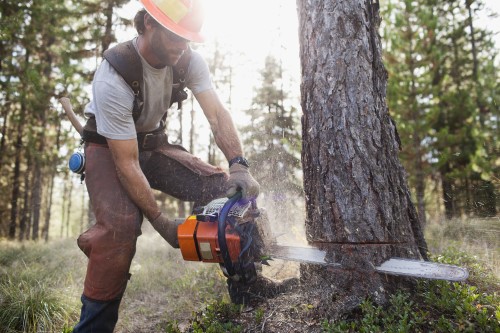Logging Insurance Ottawa

Insurance for the Forestry Sector
Forestry companies and contractors need logging insurance in Ottawa. The capital is the fourth-largest city and metropolitan area in Canada and also has the largest rural economy among all major Canadian cities. Logging contractors and companies thrive in Ontario, a province that is home to 20% of Canadian forests. A HUB International broker can help owners and operators of logging companies assess risks and minimize exposures associated with natural products, mobile equipment and worker safety.
Policies for Logging Insurance in Ottawa
Around 66% of Ontario is forested, which adds up to 70.4 million hectares. Approximately 1.6 million hectares of forest in this province experience disturbances every year from causes such as fire, disease or insects, which can impact logging operations. The Crown Forest Sustainability Act and other Ontario forest sector strategies can also factor into coverage requirements for logging firms in this province. Commercial and contract logging companies in Ottawa and the National Capital Region need insurance to minimize risk exposure in several key areas:
- Safety: The Ontario Workplace Safety and Insurance Board administers workers’ coverage in accordance with requirements set forth in the Workplace Safety and Insurance Act. HUB Loss control team can work with you to develop proper training for your employees to ensure their safety and reduce your risks.
- Liability: In addition to injury risks to employees, liability coverage for incidents that occur on commercial properties is also essential for forest sector enterprises. A HUB broker can help logging company owners and contractors assess and address liability risks.
- Property: Property insurance can limit losses of equipment or products. Property and casualty policies and surety bonds can limit these risks.
Coverage for Timber and Lumber Companies
Forestry in Ontario creates around 50,000 direct jobs, and the total revenue of this sector of the provincial economy was $17.6 billion as of 2019. Logging firms in the capital supply materials to sawmills and mills that produce pulp, paper, composite materials, veneers, bioproducts and other forest products located across Ontario. Stakeholders at forestry and wood product firms should consider the following types of policies related to logging insurance in Ottawa:
- Automotive and Equipment: Commercial auto and inland marine policies can cover risks and limit losses associated with vehicles and mobile logging equipment. Many logging companies rely on trucks for short- or long-haul cargo transportation.
- Commercial Property Policies: Property policies can cover workplaces in the forest sector. Look for property policies that cover the most relevant perils, such as fire and liability for injuries.
- Bonds for Timber: Timber sales bonds are surety bonds for forestry operations. These bonds provide obligees with financial backing based on the ability of contractors to meet contractual terms.
- Employee Benefits Packages: Employee benefits in Ontario could include paramedical coverage or retirement packages to supplement Registered Retirement Savings Plans. These benefits can give companies a competitive edge for hiring and retaining employees.
- Loss Control Policies: Loss control can offer additional protection for equipment and tools on worksites. Logging companies often operate in challenging environments, and additional coverage can reduce costs associated with repairing or replacing damaged machinery.
An insurance broker can recommend these and other policy packages to minimize exposures. Comparing policy terms and premiums can enable any enterprise to obtain cost-effective and comprehensive coverage. A broker will factor in the operations of a logging company and consider covered perils and exclusions under current policies when recommending additional insurance coverage.

